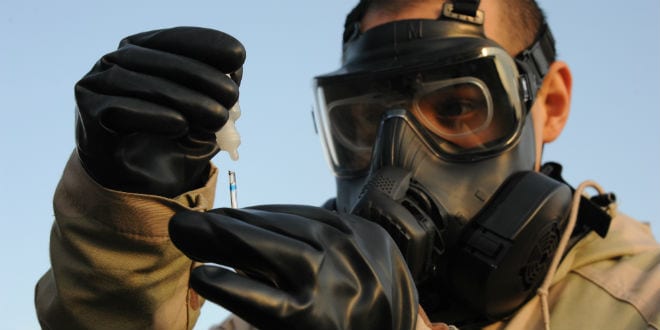The Islamic State used poison mustard gas against Kurdish fighters in Iraq in 2015, said a diplomat reporting on tests done by global arms watchdog Organization for the Prohibition of Chemical Weapons (OPCW).
According to a source at the OPCW, laboratory tests confirmed the presence of the chemical weapon after a number of Kurdish soldiers fell sick in August of 2015. While the OPCW would not confirm who released the gas, the diplomat, speaking on condition of anonymity, said that the test results proved ISIS fighters had used the chemical agent.
The samples were taken after the soldiers became ill while fighting with ISIS militants southwest of Erbil, which is the capital of Iraq’s Kurdish region. ISIS launched about 50 mortars, most of which “released a white dust and black liquid when they exploded,” said Iraqi Kurd authorities.
After 35 Peshmerga (Kurdish fighters) were exposed, blood tests revealed traces of mustard gas, said the Kurdish ministry, but the origin of the gas was unclear.
In September, a US official confirmed that ISIS was manufacturing and using sulfur mustard in its territories in Iraq and Syria, and last week, US national intelligence director James Clapper told a congressional committee that ISIS has used toxic chemical weapons, including mustard gas, so called because of the agent’s color in impure form and its sharp odor, similar to that of mustard plants and garlic.
Hamish de Bretton-Gordon, a specialist in biological and chemical warfare, said that ISIS was likely to have developed its own capacity for making the chemical agent, The Guardian reported. “They have all the precursors at hand from the oil industry and all the experts at hand to do it” in their capital city of Mosul, he told the newspaper.
Mustard gas is a class 1 chemical agent and has very few uses outside of chemical warfare. It has powerful but generally non-lethal effects, causing temporary blindness, severe blisters and chemical burns to the skin and lungs which usually develop within 24 hours of exposure.
The Kurdish struggle against ISIS, similar to Israel’s 1948 war for independence against surrounding Arab countries, is less a fight for territory than for autonomy. The Kurdish region in Iraq is faced on all sides by its enemy, ISIS, which seeks to swallow up the Kurds’ homeland in its Islamic caliphate. Rather than submit to exile or slavery, the Kurds have fought hard to maintain their independence, pushing back against ISIS’s encroachment into their land.



